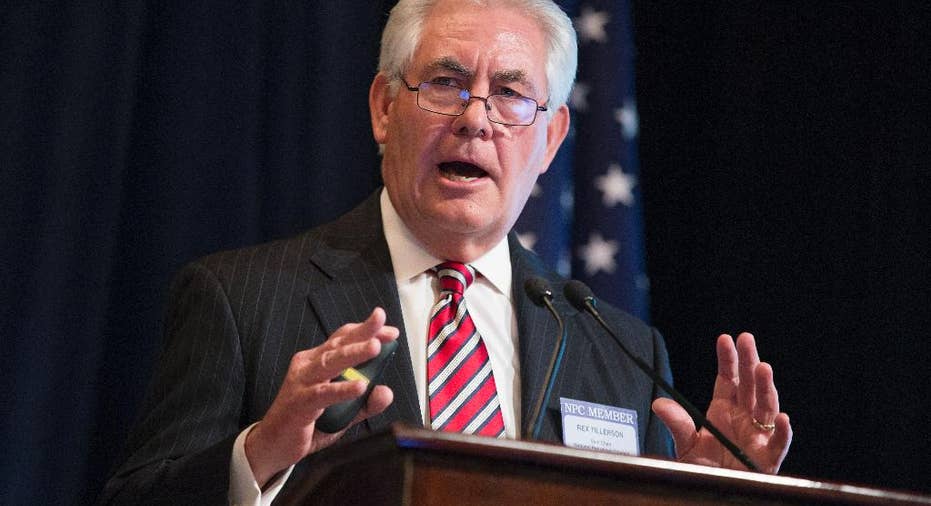Q&A: Secretary of state pick could affect climate policy

PORTLAND, Maine – President-elect Donald Trump this week tapped Exxon Mobil CEO Rex Tillerson to serve as his secretary of state. If confirmed by the Senate, where opposition is emerging, the move could have broad consequences for U.S. environmental policy and affect the role the U.S. plays in multinational discussions about climate change.
Here are some questions and answers about the selection of Tillerson.
___
Q. What's his background?
A. Tillerson, 64, is a Texas native and has spent his entire career at Exxon after graduating from the University of Texas with a civil engineering degree. He started as a production engineer and rose to become general manager of the company's oil production division in Texas, Oklahoma, Arkansas and Kansas in 1989. He was named president of Exxon Yemen in 1995 and was later put in charge of Exxon's operations in Russia and the Caspian Sea. After being named president of the corporation in 2004, Tillerson became chairman and CEO in 2006. He was expected to retire next year in line with the company's mandatory retirement age of 65.
___
Q. What's his relationship to Trump, and who was in the running for the post?
A. Trump has said he believes Tillerson's role as an international businessman for Exxon makes him uniquely qualified for the cabinet position. He has cited Tillerson's experience in "global enterprise" as evidence that Tillerson can represent U.S. interests around the world. The two share an established network of contacts in international government and business, while both lack public policy experience. Tillerson's selection for the nation's top diplomatic job came after former New York City Mayor Rudolph Giuliani and former Massachusetts Gov. Mitt Romney emerged as early favorites. John Bolton, a member of President George W. Bush's cabinet, was also mentioned.
___
Q. What is Exxon's environmental record?
A. Eleven million gallons of oil spilled when the Exxon Valdez ran aground in Alaska's Prince William Sound in 1989. The accident fouled birds and marine life and left a lasting stain on Exxon's reputation. Tillerson last year described it as a turning point that ushered in a new "culture of safety." Nevertheless, accidents and violations of pollution regulations have continued. Since 2006, Exxon's pipelines have spilled roughly 350,000 gallons of oil, costing $158 million in property damage and repairs, including major spills in Montana's Yellowstone River and in Mayflower, Arkansas. The Environmental Protection Agency lodged at least 73 enforcement cases against Exxon and related companies in the same period, resulting in $11.3 million in assessed penalties and $436 million in compliance costs, according to an Associated Press analysis.
___
Q. What is the status of the federal lawsuit involving accusations that Exxon hid climate change research?
A. Officials in Massachusetts and New York have said Exxon understood a connection between burning fossil fuels and global warming as far back as the 1970s. They contend the company deliberately misled the public about the issue. Exxon has denied the accusations, and pushed back. Exxon went to court in Dallas in June to throw out the Massachusetts request and later added a New York subpoena. Lawyers for the company have said in their lawsuit that the state investigations were politically motivated. Federal Judge Ed Kinkeade in Texas has the case.
___
Q. How has Exxon's position on climate change morphed?
A. Exxon was long considered a leading opponent of efforts to reduce greenhouse gas emissions from burning fossil fuels that scientists say is responsible for climate change. That changed over the past decade, coinciding with Tillerson's leadership and shifting energy markets, said David Levy, a management professor at the University of Massachusetts in Boston. The company now supports imposition of a "carbon tax" that would put a price on each ton of carbon emitted. Criticism lingers. "While the world needs to go one direction, he's been hell-bent as CEO trying to go the other direction," said U.S. Sen. Jeff Merkley, an Oregon Democrat.
___
Q. What has Exxon's position been on President Barack Obama's efforts to protect the environment?
A. Exxon has been critical of some of Obama's efforts to safeguard natural resources. The company, under Tillerson's leadership, has questioned the wisdom of limiting offshore oil drilling off the Atlantic coast and Alaska. Tillerson told The Associated Press last year that drilling off Alaska is important despite disapproval from environmentalists because "eventually we are going to need it" to meet energy needs. U.S. policy about domestic drilling would fall under the Interior Department more than under Tillerson.
___
Q. How would Tillerson interact with other countries on climate change?
A. Tillerson would be responsible for representing U.S. interests in international meetings on climate policy and in dealings with world powers about issues that overlap with climate, such as energy, security and environmental protection. John Kerry has put a focus on climate change as secretary of state, in keeping with the agenda of Obama. The selection of Tillerson signals to other countries that the Trump administration is changing diplomatic priorities, said Varun Sivaram, director of the Program on Energy Security and Climate Change at the Council on Foreign Relations. But he added it's important to note Tillerson has acknowledged that the world is warming. "There certainly is symbolism to nominating the CEO of the biggest oil company in the world as secretary of state," Sivaram said. "I think it's important to separate the man from the symbolism."
___
Brown reported from Billings, Montana. Associated Press writer David Koenig in Dallas contributed to this report.



















